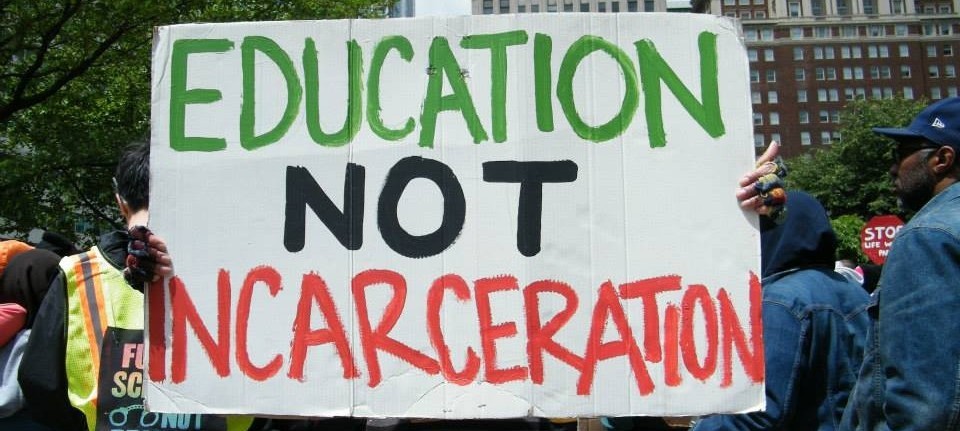Who is organizing?
Urban youths, parents, community members, and prisoners have led the charge in organizing against the school-to-prison pipeline. VOYCE, Urban Youth Collaborative, Californians for Justice, and Padres Y Jovenes Unidos are grassroots organizations led by urban youths. CADRE and Padres Unidos are parent-led grassroots groups, and Youth Justice Coalition, Blocks Together, and Power U Center for Social Change are urban whole-community collaboratives involving youths, parents, community members, and in regards to the Youth Justice Coalition, even local prisoners. These organizers are located in urban areas across the United States, including Chicago(Illinois), New York City(New York), Los Angeles, Fresno, Long Beach, San Jose, and Oakland(California), Miami(Florida), and Denver(Colorado).
What is their message?
These diverse organizers all send a similar message as to what should be done in order to dismantle the school-to-prison pipeline. Ultimately, they call for: the elimination of zero tolerance policies, restrictions on the use of exclusionary discipline, the role of school law enforcement to be limited to major infractions, the replacement of harsh disciplinary practices with Restorative Justice and community-centered approaches, school accountability and transparency with school discipline practices and records, and increased parent and student voice in the process of constructing disciplinary policy. Through these changes, the organizers hope to achieve their ultimate goal: stopping the pushout of urban youths from school and into the juvenile justice system, so that youths can stay in the classroom and receive the education they deserve and need.
What is their impact?
These groups have had a significant impact on the school-to-prison pipeline issue, as they have been able to limit the use of exclusionary discipline and school arrests, provide positive alternatives for troubled youths, push for state-level policy changes, achieve school disciplinary transparency, accountability, and parent/student voice, limit the role of school law enforcement, and stop zero tolerance policies.
VOYCE and Blocks together have successfully reduced the number of days that students can be suspended for, and both VOYCE and Power U Center for Social Change have been able to limit the use of suspensions in schools for minor offenses. VOYCE has also been able to stop student arrests for misconduct.1
Positive alternatives have also been provided by these organizations, as Californians for Justice, Blocks Together, and Power U Center for Social Change have successfully pushed for Restorative Justice approaches. Additionally, the Urban Youth Coalition has founded FREE L.A. High School, which serves as a positive alternative school for troubled youths that teaches students essential leadership skills.2
Some of these groups have also been able to push for policy changes. The Urban Youth Collaborative has gotten school discipline reform that would end suspensions for “Defying Authority” on the table of New York City’s Chancellor and other city leaders.3 Padres Y Jovenes Unidos also successfully pushed for an Intergovernmental Agreement in Denver that decreased the role of school law enforcement officers and prohibited racial discrimination in regards to school discipline.4 Additionally, CADRE has been very involved and influential in the very progressive reforms that have come through the Los Angeles Unified School District (LAUSD), supporting and helping to implement many bills that have pushed for positive alternatives to exclusionary disciplinary practices as well as helping to develop and support LAUSD’s 2013 School Discipline and School Climate Bill of Rights.5 VOYCE is also currently campaigning to pass the Safety and Equity and Education Act, which is an act that would greatly reduce the impact of exclusionary discipline and particularly help those demographics that have been disproportionately harmed by such discipline.6
These groups have also been able to push for transparency, accountability, and parent/student voice. In 2006, Blocks Together successfully pushed for the public release of school arrest rates.7 Moreover, Power U Center for Social Change pressured their community’s Assistant Superintendent to force his principals to find disciplinary alternatives that would keep students in the classroom, thus making them more accountable for school discipline.8 Californians for Justice have also successfully pushed for student voice with the passage of Local Control Funding Formula (LCFF) regulations that ensure that students are involved in funding decisions.9 VOYCE has also seen their efforts culminate in the recent passing of SB 2793, which requires public recording and reporting of school disciplinary actions and mandates that schools with high rates of school discipline send improvement plans to the Illinois State Board of Education.10
What Challenges Do They Face?
Though, undoubtedly, these organizers have had great success, there are still challenges that these groups face as a result of the nature of the task. As Pilisuk et al. note:11
“The privileged rarely surrender their benefits to meet ethical standards for equity. This leaves the disadvantaged with one option, to come together, apply creative energies, and employ collective pressures to have their needs met.”
These organizers seeking to end the school-to-prison pipeline are “the disadvantaged” that the authors speak of. For the pipeline to disappear, those seeking the change have the challenge of creating and sustaining heavy pressures on the actors involved with school disciplinary practices. For this particular issue, this task is especially challenging, because it involves broader policy changes and such changes require groups to pair with organizations that go “beyond the community confines.”11 In endeavoring to end the school-to-prison pipeline, organizers have both the task of sustaining a movement and of partnering with outside organizations that can help them achieve wide-scale policy changes. Moreover, this problem goes beyond the schools themselves. The very existence of the school-to-prison pipeline and its disproportionate effect on minorities is indicative of the broader structural racism that pervades America. To truly dismantle this pipeline, a much larger movement must be made to first eradicate the discrimination, stigmatization, and racism that still envelopes our nation.
